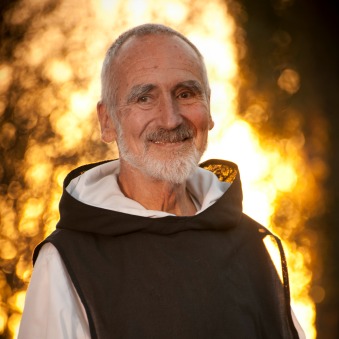In this interview excerpt, Br. David explores fullness as it relates to mindfulness, wholeheartedness, and gratefulness. These questions follow Br. David’s assertion that “all the spiritual practices in the world agree that we must cultivate the child within us.”
Br. David, could you talk a bit about your practice? What practices do you think would help people to rediscover the child?
Some people think that monks have these esoteric practices and “What can we poor laypeople do?” But when you really understand what the monastic life is about, you realize that we are only doing – under more favorable circumstances and in an environment that generations have worked on to make more favorable – something that could be practiced anywhere. I’m not talking about long hours of prayer, long hours of meditation, spiritual reading or studying, or anything like that – because the essence of monastic life does not consist in any of those. Those are all means to an end. The end – in all of the monastic traditions, of both East and West – consists in cultivating mindfulness, being mindful. And “mindful” may be a little misleading, because it sounds a bit much like mind-over-body, but it has nothing to do with mind over or against body. I think “wholeheartedness” is the English word that expresses better what mindfulness as a technical term means; that you respond to every situation from your center, from your heart – that you listen with your heart to every situation, and your heart elicits the response.
If you’re really mind-full, and if you underline that aspect of fullness, wholeness, or wholeheartedness, it reveals the gift character of everything. A partial view often misses the gift character of things. The full view consists of seeing each situation as purely gratis, and if you get that in mind, then your response is gratefulness.
That would be my practice: to try to live gratefully. Sometimes gratefulness has a passive connotation: You sit back and say thanks or something like that. Well, again, that’s not grate-fullness. The fullness shows itself when you realize that the gift within every gift is opportunity – mostly the opportunity to enjoy. We have thousands of opportunities every day to be grateful: for having good weather, to be able to sit in such a beautiful room on such comfortable furniture, to have slept well last night, to be able to get up, to be healthy, to have enough to eat. When you begin to think about just those most basic and obvious things, then you begin to think of the other people who don’t have any of this – of the people who are blind, who are lame, who are sick in bed, who are dying. But even before you start that, you should learn to enjoy those things which you have and be grateful. There’s opportunity upon opportunity to be grateful; that’s what life is.
Gratefulness is the only appropriate response to that which is given – and this life is a given. Every human being can realize that: We didn’t make ourselves, we didn’t even choose this life. If you train yourself to be grateful for everything, every moment, then when you come to something that you don’t like, you realize it’s still given and you have to deal with it. You will be alert to the gift within every gift, which is opportunity. In this case it may not be opportunity to enjoy but primarily the opportunity to do something about it.
That’s what we find ourselves confronted with now. The arms race, nuclear disasters, ecology, and world hunger, and all the different things we could list are not something for which you could off-hand be grateful, but you can be grateful that you see the challenge and that you can do something about the challenge. And that will give you the energy to do something.
So even in this respect, I think gratefulness is the key to everything. If you want a one-word description of monastic practice and of my practice and the practice I suggest, there it is: gratefulness—with an emphasis on fullness and on activity and on opportunity, taking the opportunity.
Very specifically, how do you practice this wholeheartedness in the moment?
Well, I just try to be present where I am and present to what confronts me. At this moment, for example. I’m trying to practice it by enjoying your company and responding to your questions and thinking a little bit about your concern and the readers you want to reach, trying to share with them…all very simple. But we tend to forget how many, many hours every day we do things that we really enjoy or could enjoy and should enjoy. I mean, washing ourselves is not just something to get over with; eating and washing the dishes could be like a tea ceremony; there’s cleaning clothes, going to bed… We all spend a lot of time going from one place to the other; if we have our mind on the place we just left or on the place we’re heading to, half of our life is lost. But if you enjoy the going, enjoy walking, enjoy touching the earth with your feet, enjoy driving a car or riding a bike, it’s as simple as that.
It comes back to the child, I guess, because children are doing this all the time. You don’t have to constantly reflect on it and say to yourself, “Oh, now I’m really nicely grateful” or something like that – you just do it.
To read the full interview see All in the Same Boat.
Reprinted from an interview by Rex Weyler and Catherine Ingram in New Age, September 1983, Vol. 9, #2, pp. 36-40 and 62-64.



Comments are now closed on this page. We invite you to join the conversation in our new community space. We hope to see you there!